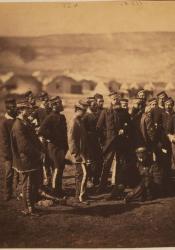The Charge of the Light Brigade
In 1854, Alfred Lord Tennyson wrote and published a poem titled The Charge of the Light Brigade. The poem is named after a light cavalry charge during the Battle of Balaclava in the Crimean War. The Battle of Balaclava occured on October 25, 1854 in Balaclava, Crimea near the Black Sea. Although, the charge of the light brigade is the most notable cavalry charge of the Battle of Balaclava and perhaps the most notable cavalry charge of the Crimean War. However, the charge by British light cavalry was not the only cavalry charge of the battle. It was not even the only British cavalry charge of the battle. However, it is the disastrous charge of Field Marshal FitzRoy James Henry Somerset (Lord Raglan)’s light brigade of cavalry that affected the emotions of Alfred Lord Tennyson and motivated the poet to write The Charge of the Light Brigade.
The Battle of Balaclava was a battle within the larger Siege of Sevastopol in which an alliance of British, French, and Ottoman military units attacked the port city of Sevastopol, Crimea that was being defended by Russian military units. The British military units were positioned on the right flank of the allied front. The British military of the right flank was numerically low in men in comparison to the respective French and Ottoman flanks. General Pavel Leprandi of the Russian Imperial Army recognized the weak British flank and sought to expose it. General James Yorke Scarlett successfully repelled the Russian charge with his own charge of heavy cavalry. However, the charge was largely successful and thus there is no “Charge of the Heavy Brigade” poem. Lord Raglan then commanded Major General James Brudenenell (Lord Cardigan) to defend abandoned Turkish guns from Russian seizure. There was a miscommunication however, and the British light brigade of cavalry instead charged a Russian artillery battery and suffered immense casualties.
The second stanza depicts the discipline of the light brigade and their service to their country and their chain of command despite the incompetence of that chain of command.
'Forward, the Light Brigade!'
No man was there dismay'd,
Not tho' the soldier knew
Some one had blunder'd
Theirs not to make reply,
Theirs not to reason why,
Theirs but to do and die,
Into the valley of Death
Rode the six hundred.
The third stanza depicts the brutality of the charge. It also depicts the inevitability of death for the British troopers.
Cannon to right of them,
Cannon to left of them,
Cannon in front of them
Volley'd and thunder'd;
Storm'd at with shot and shell,
Boldly they rode and well,
Into the jaws of Death,
Into the mouth of Hell
Rode the six hundred.
The seventh and final stanza of the poem honors the British troopers and laments the loss of life.
When can their glory fade?
O the wild charge they made!
All the world wonder'd.
Honour the charge they made!
Honour the Light Brigade,
Noble six hundred!
The poem is a tribute to the troopers who died in the charge on the fields of Balaclava. It is literary martyrdom. Tennyson would surely want the world to “honour the charge they made” allow peace to prevail in the Crimean peninsula of Ukraine. However, acts of Russian aggression have trampled on the “noble six hundred” as the people of the United Kingdom and of the world fear for further military escalation in Crimea.
Works Cited
Tennyson, Lord Alfred. The Charge of the Light Brigade. 1854. COVE Studio.
https://studio.covecollective.org/anthologies/sp22-eng-l302-anthology/do...

